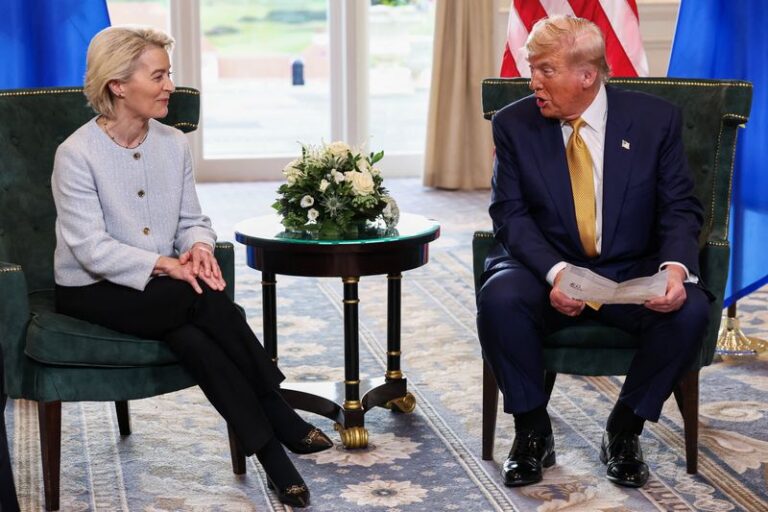TURNBERRY, Scotland (Reuters) -U.S. President Donald Trump on Sunday said the United States and the European Union had reached agreement on a trade deal that includes a 15% tariff on EU goods entering the U.S. and significant EU purchases of U.S. energy and military equipment.
The deal also calls for $600 billion in investments in the U.S. by the EU, he told reporters.
This follows a U.S. deal with Japan on July 23 that cut tariffs on auto imports and other goods in exchange for a $550 billion package of U.S.-bound investment and loans.
Major financial markets were still closed. The euro ended last week around three-week highs at $1.1738, while the STOXX 600 <.STOXX> hit its highest since early June last week as optimism built for a EU-U.S. trading deal.
Following are comments from business leaders and companies, and market reaction to the announcement.
COMMENTS:
HOLGER SCHMIEDING, CHIEF ECONOMIST, BERENBERG BANK, LONDON:
“First the good news: the crippling uncertainty is largely over, the deal is bearable for the EU. Modestly good news for equity markets, that probably priced in most of it beforehand. The deal seems to be largely in line with the reports about a potential deal last Thursday.”
“Trump can claim that the asymmetric deal is a ‘win’ for him. But of course, the outcome is still bad relative to the situation that prevailed before Trump started his trade wars.”
“The U.S. will pay a heavy price for Trump‘s backward-looking protectionism through higher prices for consumers and less trend growth. Together with Trump‘s clampdown on immigration, his protectionism reduces U.S. trend growth from 2% to 1.5%.”
BRIAN JACOBSEN, CHIEF ECONOMIST, ANNEX WEALTH MANAGEMENT, BROOKFIELD, WISCONSIN:
“President Trump said the trade deal with the EU is the biggest of all the deals. Whether it’s imports or exports, Mexico, China, and Canada are bigger deals than the EU. So, this is the biggest deal until the next one.”
“Settling into an average 20% tariff rate is better than the Liberation Day tariff rate of 25%, but it’s still a lot higher than the 2024 tariffs of 2.5%.”
“Tariffs are a stick to make it more expensive to produce outside the U.S. The One Big Beautiful Bill has a number of carrots in it to make it cheaper to produce inside the U.S. It’s a gamble to see if the stick-and-carrot approach to investing in the U.S. will work, especially since sticks tend to hurt right away while carrots take time to show their benefits.”
HASNAIN MALIK, STRATEGY HEAD OF EQUITY RESEARCH, TELLIMER, DUBAI:
Story Continues
